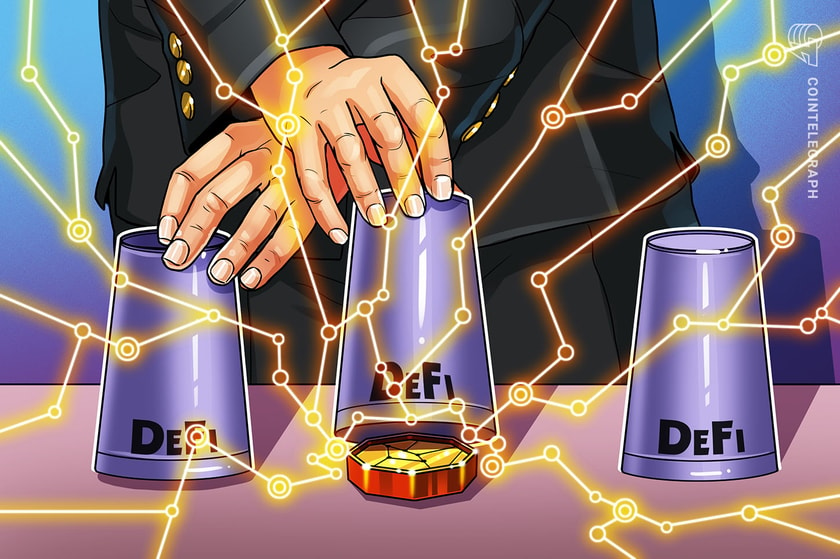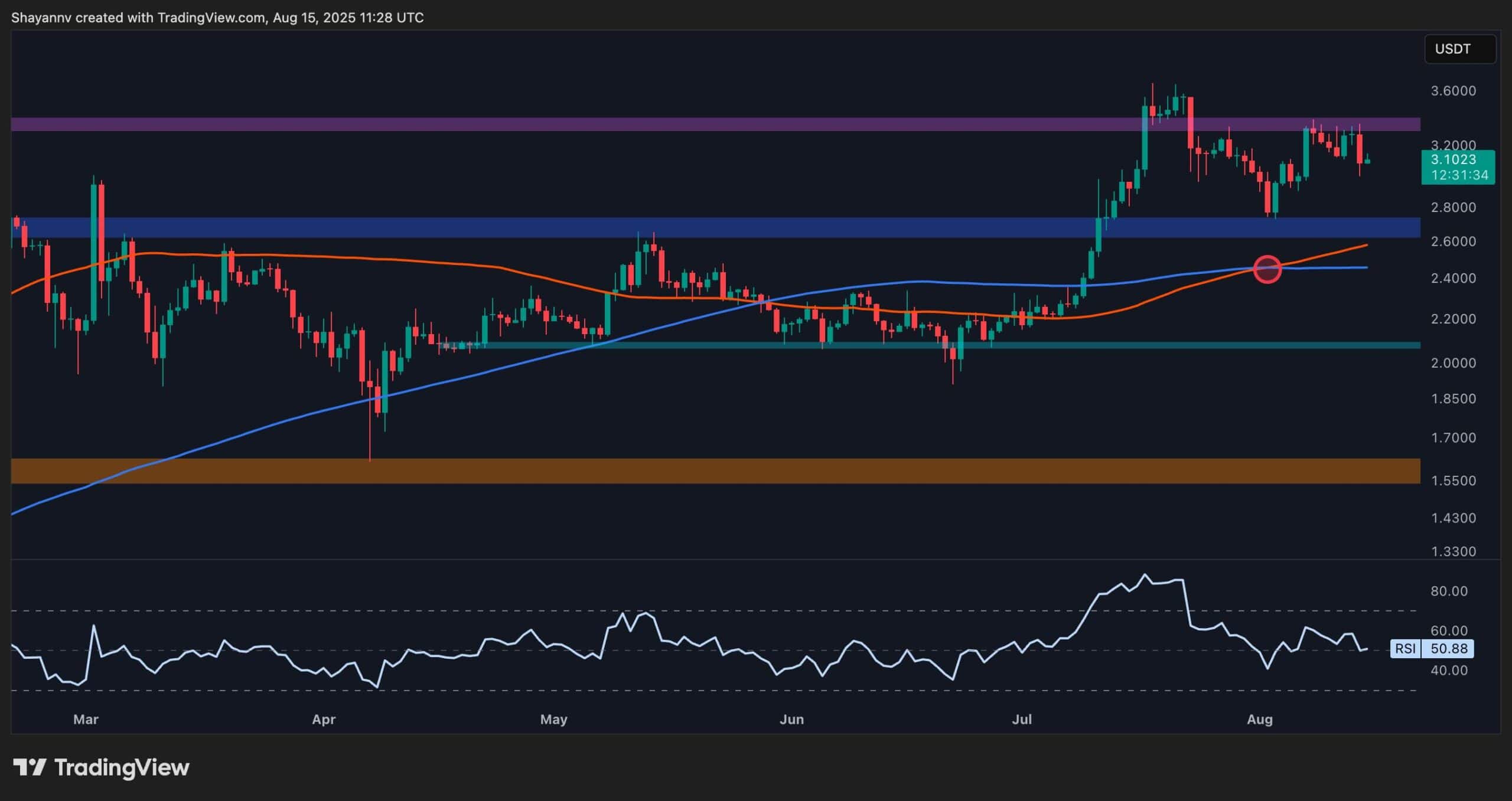Cryptocurrency
DeFi as a solution in times of crisis

The 2020s have been a challenging decade so far, yet the transformative power of blockchain technology offers a better path forward.
Born from crisis
Around the globe, times are tough for many everyday people. Increases in cost of living minimized any growth in wages last year as inflation continues to take its toll. Additionally, world powers such as China and Russia are increasingly challenging the dominance of the USD as geopolitical tensions flare up.
In this precarious new world, decentralized cryptocurrencies can potentially be a source of stability and freedom. Bitcoin first emerged in the wake of the 2008 banking crisis and the impact of events like the Lehman Brothers collapse is evident in the writings of Bitcoin’s pseudonymous creator Satoshi Nakamoto.
While the subprime mortgage crisis was in full swing in February 2009, Nakamoto proposed an “e-currency based on cryptographic proof” that enables secure and effortless transactions without the need for a trusted third-party middleman. But has crypto lived up to its promise so far, and can DeFi help solve the ongoing instability of the 2020s?
A better system is possible
Cryptocurrencies like Bitcoin indeed help overcome issues with the current banking and monetary system in several different ways. For example, self-custody of DeFi assets protects individual investors against risks like institutional insolvency and bank runs. The collapse of Silicon Valley Bank in March 2023 shows that even large banks are still vulnerable to failure. But instead of requiring trust that their money is still there, Web3 users can verify their holdings directly on chain.
Additionally, blockchain technology allows for a more efficient and decentralized financial landscape. The peer-to-peer network pioneered by Bitcoin means that investors can hold their own assets and transact directly with no middlemen and significantly lower fees. And unlike with traditional banks, the rise of DeFi sectors like DEXs, lending and liquid staking means individuals can now have full control over exactly how their deposited assets are used.
Inflation is yet another ongoing problem that crypto and DeFi help solve. Unlike fiat currencies, cryptocurrencies like bitcoin have a fixed total supply. This means that your holdings in BTC cannot be easily diluted like if you hold a currency such as USD. While a return to the gold standard of years past is sometimes proposed as a potential solution to inflation, adopting crypto as legal tender would have a similar effect while also delivering a range of other benefits like enhanced efficiency.
CBDCs: A potential alternative?
As global superpowers battle for financial supremacy, everyday people around the world can benefit from decentralized and censorship-resistant assets like Bitcoin. Yet because cryptocurrencies pose a threat to the dominance of the current monetary system, many governments are taking measures to issue their own centralized digital currency.
Institutions such as the Federal Reserve and European Central Bank have been actively exploring the issuance of Central Bank Digital Currencies (CBDCs). In some ways, it is possible to equate the benefits of CBDCs with the utility of crypto. For example, a so-called digital dollar could help deliver faster and cheaper transactions while expanding access to the financial system.
However, CBDCs lack several of the key benefits of cryptocurrency. For one, they are still highly centralized like traditional fiat currencies. This means that true self-custody is not possible and your assets can be frozen by financial authorities at any time. CBDCs may also not help stem issues with inflation since they still allow central banks to print money through measures like quantitative easing. Overall, CBDCs only deliver a fraction of the benefits of decentralized cryptocurrencies.
Why not CEXs?
The Web3 community proposes a better alternative. With decentralized cryptocurrencies like Bitcoin, ordinary people can enjoy the benefits of digital money without facing the same problems that plague existing fiat currencies. Especially in times of crisis, DeFi is a great way to keep your money secure and under your direct control. Yet in order for DeFi to truly explode, the user experience needs to catch up with centralized finance.
Currently, the easiest way to buy and send crypto is with a centralized exchange (CEX). Like CBDCs, users of platforms like Coinbase and Binance must sacrifice some transparency and decentralization for a streamlined user experience. But events like the FTX collapse show centralized exchanges can become over-leveraged and insolvent just like traditional banks. Since many users are unaware of the advantages of DeFi and self custody, further education is key.
While writing down your seed phrase in a secure location is harder than quickly making an account on a CEX, the benefits are definitely worth it. When you have self custody, you can always track your assets directly on the blockchain and even move your funds to a hardware wallet for extra security. Plus, investors can make solid passive income on their investments at the same time with low-volatility DeFi strategies such as stablecoin farming.
DeFi could be the answer
In addition to continued instability within our financial system, the 2020s have also featured a heightened level of geopolitical turmoil. However, decentralized finance offers the chance to safeguard our financial freedom. We must stand up together to build a fair digital economy and a better fiscal world. While DeFi already offers a range of revolutionary opportunities for small investors, the community needs to keep pushing for more applications, improved education and a better user experience in order to achieve worldwide mass adoption.
Bitcoin helped pioneer this new era, but the future envisioned by Satoshi Nakamoto requires our continued efforts. Once the mainstream population can access DeFi as easily as walking into a traditional brick and mortar bank, the sky is the limit for Web3 adoption. In the meantime, it’s important to maintain a critical lens about the potential downsides of CEXs and government attempts to replace crypto with their own watered-down digital currencies.
The information provided here is not investment, tax or financial advice. You should consult with a licensed professional for advice concerning your specific situation.
Wolfgang Rückerl is the CEO of Istari Vision and Entity.global. His expertise is in Web3 startups, DeFi and GameFi.
This article was published through Cointelegraph Innovation Circle, a vetted organization of senior executives and experts in the blockchain technology industry who are building the future through the power of connections, collaboration and thought leadership. Opinions expressed do not necessarily reflect those of Cointelegraph.
Cryptocurrency
Ethereum Foundation, Whales, and Hackers: What’s Driving the ETH Sell-Off?

TL;DR
- Whales, hackers, and the Ethereum Foundation wallets moved over $500M in ETH through large sales and withdrawals.
- Ethereum transfers rose to 4.6M ETH, nearing the monthly high of 5.2M recorded in July.
- Staking inflows hit 247,900 ETH, the highest in a month, locking more supply from trading.
Large Withdrawals and Whale Activity
Ethereum (ETH) has seen heavy movement from major wallets over the past few days. On-chain data from Lookonchain shows a newly created wallet pulled 17,591 ETH, worth $81.62 million, from Kraken in just two hours.
Over three days, two new wallets withdrew a combined 71,025 ETH, valued at $330 million, from the exchange.
One of these wallets, address 0x2A92, has withdrawn 53,434 ETH, worth $242.34 million, in two days. This includes a recent purchase of 30,069 ETH, valued at $138.46 million, during a market drop.
Major ETH Holders Offload Millions Amid Price Rally
In contrast, several separate entities have been disposing of some ETH holdings. A wallet tied to a hacker address 0x17E0 sold 4,958 ETH for $22.13 million at $4,463, securing a profit of $9.75 million. Earlier this year, the same address sold 12,282 ETH at $1,932 and later bought back part of the amount at higher prices.
A different whale sold 20,600 ETH for $96.55 million over the past two days, generating a profit of more than $26 million after holding the position for nine months.
Meanwhile, an Ethereum Foundation-linked wallet, 0xF39d, sold 6,194 ETH worth $28.36 million in the last three days at an average price of $4,578.
Recent sales from the same wallet included an additional 1,100 ETH and 1,695 ETH for over $12.7 million combined.
The #EthereumFoundation-linked wallet(0xF39d) sold another 1,300 $ETH($5.87M) at $4,518 ~11 hours ago.
Over the past 3 days, this wallet has sold a total of 6,194 $ETH($28.36M) at an average price of $4,578.https://t.co/4hfCWymHVG pic.twitter.com/ErUyEY8SJy
— Lookonchain (@lookonchain) August 15, 2025
Network Activity on the Rise
CryptoQuant data shows Ethereum’s total tokens transferred have been climbing since August 9. After ranging between 1 million and 3 million ETH through late July and early August, transfers have risen to 4.6 million ETH, approaching the monthly high of 5.2 million recorded in mid-July. This increase has occurred alongside a price rally from about $3,400 to $4,600.
Interestingly, staking inflows generally stayed between 20,000 and 80,000 ETH per day over the past month. On August 14, inflows jumped to 247,900 ETH, the highest in the period.
At the time, ETH was trading near $4,600. Large staking deposits reduce the amount of ETH available for immediate trading, as staked coins are locked for a set period.
In the meantime, ETH trades at $4,647 with a 24-hour volume of $68.25 billion, down 2% on the day but up 19% over the week.
Binance Free $600 (CryptoPotato Exclusive): Use this link to register a new account and receive $600 exclusive welcome offer on Binance (full details).
LIMITED OFFER for CryptoPotato readers at Bybit: Use this link to register and open a $500 FREE position on any coin!
Cryptocurrency
Massive DOGE Whale Activity Hints at $1 Breakout

TL;DR
- Whales bought two billion DOGE this week, lifting their combined holdings to 27.6 billion coins.
- A single 900M DOGE transfer worth $208M to Binance drew attention to large exchange movements.
- DOGE broke key resistance, with momentum building for a possible push toward the $1 price mark.
Price and Market Moves
Dogecoin (DOGE) traded at $0.23 at press time, slipping 4% over the past day but still showing a 2% gain for the week. Daily turnover came in at about $6.18 billion.
Meanwhile, the broader crypto market saw over $1 billion in liquidations. Hotter-than-expected US Producer Price Index data pushed traders to scale back expectations of a near-term Federal Reserve rate cut. DOGE had roughly 290,500 coins liquidated during the sell-off.
On the two-week chart, analyst Trader Tardigrade notes that DOGE has cleared a downward-sloping resistance line after completing what appears to be a “wave V” in an Elliott Wave sequence. Similar setups in the past, where prolonged declines stayed within falling channels before breaking higher, have been followed by sharp rallies.
$Doge/2-week#Dogecoin is gaining strong momentum to surge above $1 pic.twitter.com/TuSEKr19nv
— Trader Tardigrade (@TATrader_Alan) August 15, 2025
Momentum gauges are also turning up. The Stochastic RSI, which had dropped into oversold territory, is now heading higher. Previous reversals from this zone have coincided with sustained upward moves. The current formation points to a possible run that could carry DOGE past the $1 mark.
Heavy Whale Buying and Large Transfers
As reported by CryptoPotato, blockchain data shows large investors have added two billion DOGE in the past week, spending just under $500 million. That brings their holdings to about 27.6 billion coins, or 18% of the supply. The buying streak has prompted speculation within the community.
Recently, Whale Alert flagged a 900 million DOGE transfer worth about $208 million into Binance. The tracking indicates that it originated from a wallet connected to the exchange, likely as an internal activity. The address involved holds 2.88 billion DOGE, one of the largest balances on the network.
Ali Martinez also reports that transactions above $1 million reached a one-month high, with activity building since early August and peaking as DOGE traded at $0.25.
Whales are back! Dogecoin $DOGE activity at a 1-month high. pic.twitter.com/C83Pv68mCt
— Ali (@ali_charts) August 14, 2025
Sentiment Building
Analyst Gordon described the current setup as “a nice bit of consolidation” before a potential breakout, adding,
“This will be one of the first coins normies FLOCK to & the pump will be MASSIVE.”
With whale accumulation rising, high-value transfers increasing, and a bullish technical pattern in play, DOGE is positioned for a potential push toward $1 if momentum holds.
Binance Free $600 (CryptoPotato Exclusive): Use this link to register a new account and receive $600 exclusive welcome offer on Binance (full details).
LIMITED OFFER for CryptoPotato readers at Bybit: Use this link to register and open a $500 FREE position on any coin!
Cryptocurrency
Ripple Price Analysis: XRP at Risk as Key Support Levels Could Trigger Sharp Drop

XRP has recently entered a consolidation phase after a strong rally earlier this summer, with the price action now hovering around key resistance levels on both its USDT and BTC pairs. Yet, while momentum has slowed, the charts still indicate a generally bullish structure, with multiple key support levels remaining firmly in place.
Technical Analysis
By ShayanMarkets
The USDT Pair
On the XRP/USDT daily chart, the price is currently trading near the $3.10 mark, facing a strong resistance zone around $3.40. This follows a breakout above the $2.70 range in July, which has now flipped into a support area.
Both the 100-day and 200-day moving averages are also trending upward and recently formed a bullish crossover around $2.45, reinforcing the medium-term bullish sentiment. If the $3.40 resistance breaks, a push toward the critical $4.00 range becomes likely.
However, the RSI hovering near the neutral 50 level suggests a lack of strong momentum for now, meaning a short-term pullback into the $2.80 support zone is still possible.
This zone will be key for maintaining the bullish structure. Losing it could open the door for a deeper correction toward the 200-day moving average located around the $2.40 mark. Yet, as long as the price stays above the moving averages, the broader trend remains bullish.
The BTC Pair
Looking at the XRP/BTC chart, the pair has recently pulled back after hitting the 3,000 SAT resistance, with the price currently around 2,600 SAT.
This follows a clean breakout above the long-term descending channel and a successful retest of its upper boundary, which coincided with the 200-day moving average and the 2,400 SAT support zone. This confluence remains a key bullish technical factor, as holding above it could attract renewed buying pressure.
That said, RSI levels around 48 show that momentum has cooled after the sharp July rally, meaning XRP may continue ranging between 2,400 SAT and 3,000 SAT in the near term. A decisive close above 3,000 SAT would likely open the path to the 3,400 SAT zone, while losing 2,400 SAT could shift the bias back toward 2,000 SAT support. For now, the structure still favors the bulls as long as higher lows remain intact.
Binance Free $600 (CryptoPotato Exclusive): Use this link to register a new account and receive $600 exclusive welcome offer on Binance (full details).
LIMITED OFFER for CryptoPotato readers at Bybit: Use this link to register and open a $500 FREE position on any coin!
Disclaimer: Information found on CryptoPotato is those of writers quoted. It does not represent the opinions of CryptoPotato on whether to buy, sell, or hold any investments. You are advised to conduct your own research before making any investment decisions. Use provided information at your own risk. See Disclaimer for more information.
Cryptocurrency charts by TradingView.

 Forex4 years ago
Forex4 years agoForex Today: the dollar is gaining strength amid gloomy sentiment at the start of the Fed’s week

 Forex3 years ago
Forex3 years agoUnbiased review of Pocket Option broker

 Forex3 years ago
Forex3 years agoDollar to pound sterling exchange rate today: Pound plummeted to its lowest since 1985

 Forex4 years ago
Forex4 years agoHow is the Australian dollar doing today?

 Cryptocurrency4 years ago
Cryptocurrency4 years agoWhat happened in the crypto market – current events today

 World3 years ago
World3 years agoWhy are modern video games an art form?

 Commodities4 years ago
Commodities4 years agoCopper continues to fall in price on expectations of lower demand in China

 Economy3 years ago
Economy3 years agoCrude oil tankers double in price due to EU anti-Russian sanctions



























